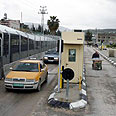
West Bank checkpoint. Easements needed for economic boost
צילום: AFP
IMF: West Bank economy on course for growth
Growth projected for West Bank economy for first time since 2005. International lending agency estimates that growth conditional on Israel's policy towards Palestinians
The West Bank's economy remains on course to grow about 7% this year, for the first growth since 2005, the International Monetary Fund said.
In notes to media accompanying a report the IMF will present to donors at the United Nations on September 22, the international lending agency said on Sunday achieving the projected figure largely depended on Israel's policy towards the Palestinians.
"For the first time since 2005, there is a realistic chance that the downward trend in Palestinians' living standards in the West Bank can be reversed in the near future, provided that (Israeli) restrictions on movement and access continue to eased," said Oussama Kanaan, the IMF's representative in the West Bank and Gaza.
Declaring it wanted to shore up the economy in the West Bank, where Western-backed President Mahmoud Abbas holds sway, Israel has removed several major military roadblocks, easing the flow of Palestinian traffic in the occupied territory.
But hundreds of roadblocks and checkpoints remain, international monitors say. Israel, which captured the West Bank in a 1967 war, says the measures are vital to Israeli security.
Kanaan called for a "timetable with specific targets for the lifting of remaining restrictions" within the West Bank, a move that could improve investor confidence.
He said growth in real GDP per capita could not be sustained in 2010 unless trade restrictions were also lifted between Israel and the Palestinian territories.
Scale back bureacratic trade barriers
Israel's prime minister, Benjamin Netanyahu, has promised to cut red tape in Israeli-Palestinian trade that includes time-consuming "back-to-back" transfers of goods to and from Israeli and Palestinian trucks at West Bank crossing points.
Turning to the Gaza Strip, a coastal enclave controlled by Hamas Islamists, Kanaan said the situation there "remains very difficult despite a limited easing" of the Israeli blockade.
Israel is under international pressure to allow a free flow of reconstruction material into the Gaza Strip to repair or rebuild buildings damaged or destroyed in the 22-day offensive it launched in December after rocket attacks by militants.
In his notes, Kanaan said the fiscal policies of the Palestinian Authority, whose power base had been limited to the West Bank since Hamas seized the Gaza Strip from Fatah forces loyal to Abbas in 2007, were prudent.
"Continuation of fiscal retrenchment, combined with lower projected emergency spending for Gaza, will result in a substantial reduction in the recurrent (Palestinian Authority) budget deficit from $1.5 billion in 2009 to $1.2 billion in 2010," he wrote.










